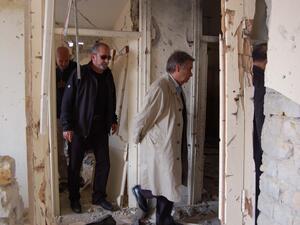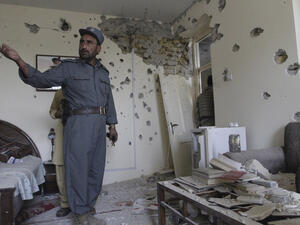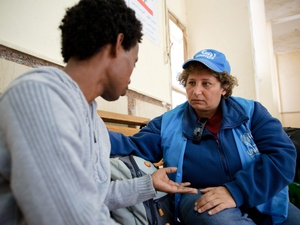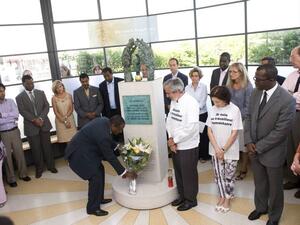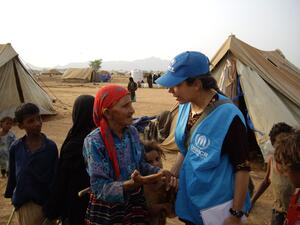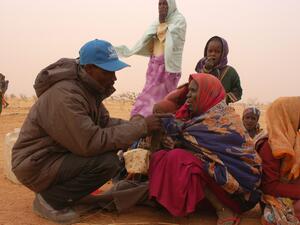Timor murders: UNHCR staff still in shock
Timor murders: UNHCR staff still in shock
UNHCR staff around the world are still in shock over the brutal murders of our three colleagues on Wednesday in Atambua, West Timor. The bodies of Samson Aregahegn, Carlos Caceres and Pero Simundza are now in Dili, East Timor, where positive identification of the remains must be made before they can be flown out. UNHCR staff worldwide share the grief of the families of these three brave men.
Mr. Aregahegn, a 44-year-old supply officer, was an Ethiopian citizen and joined UNHCR in 1990 as a field assistant in Aware, Ethiopia. In June 1993 he was transferred to Jijiga, Ethiopia, where he served as associate logistics officer until January of this year when he was transferred to Indonesia. He leaves a wife.
Mr. Caceres, a 33-year-old American citizen, had been in Indonesia since March of this year as a protection officer. A lawyer, Mr. Caceres graduated from Cornell Law School in New York in 1991 and joined UNHCR in Moscow as an associate protection officer in 1997. Mr. Caceres was unmarried. His parents live in Florida.
Mr. Simundza, 29, a telecommunications operator, was a Croatian citizen and joined UNHCR in Croatia in 1993, working in Metkovic. In November 1996 he moved to the UNHCR office in Mostar, Bosnia-Herzegovina, from where he departed on a mission to West Timor as telecommunications operator. Mr. Simundza was also an active radio amateur and one of the first to receive a license for broadcasting from East Timor. His friends and colleagues have opened an internet page (www.qsl.net/9a4sp) where a book of condolences can be signed. Mr. Simundza was unmarried. His parents live in Split, Croatia.
Messages of condolence from around the world have been pouring in and on behalf of the families, friends and colleagues of the victims we would like to thank everyone for their care and concern. Memorial services are being arranged in a number of places by UNHCR staff for the three men and we will inform you of the details as soon as final arrangements are made. On Wednesday afternoon, headquarters staff gathered at UNHCR to honour the slain men and other activities are being arranged.
Meanwhile, there are continuing reports of a very volatile situation on the ground in West Timor, including unconfirmed reports of marauding militiamen carrying out attacks on civilians. As a result, we have also evacuated local staff and their families. So far, a total of 391 UN and NGO workers have been evacuated from Atambua and Kupang since Wednesday - 134 from the Atambua area and 257 from Kupang.
This morning, a total of 73 local staff, dependents, plus several NGO local staff left Kupang, West Timor - 56 on an IOM charter flight and 17 on a commercial Merpati flight to Denpasar, Bali. Another 14 workers of aid agencies and their dependents left Atambua this morning overland for the East Timor border town of Batugade.
Since the beginning of the 1990s, 18 UNHCR staff members have been killed in deliberate, premeditated and armed attacks. Dozens of others have been wounded. These are direct staff members, but you have to remember that much of the actual hands-on work in the field for UNHCR is carried out by NGOs. If deaths and injuries of NGO staff and others involved in UNHCR operations are taken into account, these grim statistics are much higher.
Question: What becomes of the refugees in West Timor?
Answer: We are gravely concerned about their safety and we certainly hope the government, which is responsible for the camps, will provide the necessary safety and security. As far as other assistance, most of the food they received came through the government, so we would hope that continues. However, there are other sectors where they are going to feel it - supplementary feeding; sanitation; health; return.
Question: What will it take for you to go back?
Answer: Right now we are trying to deal with the present. We continue to evacuate people, we have severely traumatized staff and other colleagues, we are trying to understand what happened and why, and we are trying to deal with all of the immediate responsibilities associated with this tragedy.
Question: Your Asia bureau director and security chief have gone to Timor. Surely there will be a review. Is it a matter of "when" you go back or "if?" What conditions have to be met? How deep a review will you do?
Answer: As you know, I have sat up here week after week talking about the need for guarantees and assurances. Now three people are dead. The time for words has passed. We need to see actions. I think we will go back to square one and look at everything that has happened. The government has talked about sending more troops to Timor - three battalions. We'll see. Right now, it's a probably more a matter of "if ," not "when."



